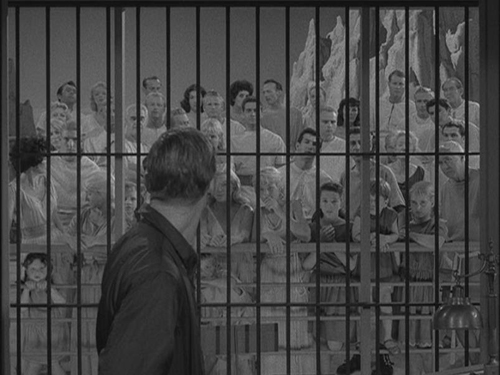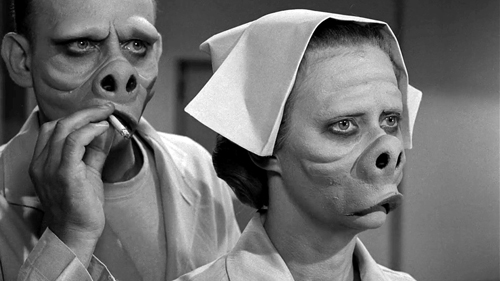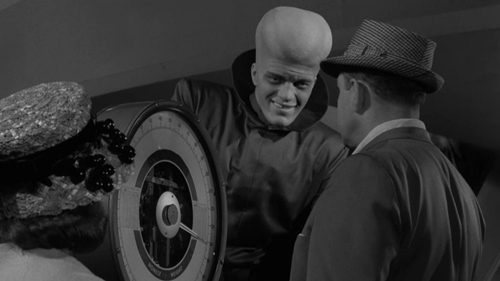
Your complimentary articles
You’ve read one of your four complimentary articles for this month.
You can read four articles free per month. To have complete access to the thousands of philosophy articles on this site, please
Television
The Twilight Zone
Alex Hooke meets Nietzsche and Sartre… in The Twilight Zone.
“I sought great human beings. I never found anything but the apes of their ideal.”
Nietzsche, Twilight of the Idols“Everything began to spin and I found myself sitting on the ground: I laughed so hard I cried.”
Sartre, ‘The Wall’
I walk up to the bar and I order a beer. The bartender recognizes me and brings the usual. Then he quietly says, “We have some unusual guests. Slowly turn to look at the table behind you.” I’m impatient and turn my head immediately. One of them has a huge mustache and dark, focused eyes. The other is smoking a pipe and has a lazy eye that seems to be looking at me rather than his drinking partner. The pub is relatively quiet this afternoon, so I can also overhear snippets of their exchange. It’s highlighted with terms like ‘nothingness’, ‘eternal recurrence’, ‘bad faith’, ‘useless passion’, and ‘ übermensch’.
I can’t believe my eyes or ears. It looks like them. It sounds like what they might talk about. But they’re supposed to be dead. I ask the bartender what’s going on. Suddenly, the bartender lights up a cigarette, leans over the bar, and quietly mutters, “You just walked into a bar whose happy hour is now called… The Twilight Zone.”
The Existential Zone
The original Twilight Zone was an American television show that lasted only five years. Despite its brief span, from 1959 to 1964, many critics rank it among the ten most important and influential TV shows of all time.
A creation of Rod Serling, The Twilight Zone was indeed both revolutionary and prophetic. Television audiences entertained by bland game shows and suburban sitcoms had never seen anything like it. In their living rooms they were introduced to erotic robots, aliens feasting on humans, lost souls in another time or space, machines dictating the actions of people, obsolete individuals sentenced to death, insidious tricks devised by the grim reaper or by Satan. The audiences were dared to think and let their imaginations wonder.
Controversies introduced by The Twilight Zone with wit and surprise remain with us. Writers still use the phrase ‘twilight zone’ when alluding to odd machinations of institutions or political forums or unexplained happenings. Its legacy has lasted generations and continually inspires further creative work, such as Black Mirror. And although Lester Hunt, Noel Coward, and Mark Dawidziak have presented illuminating philosophical approaches to Rod Serling’s visions, they neglected some core existentialist themes illuminated – as well as mocked – in Twilight Zone episodes. I want to make up for that deficit a little here.
Friedrich Nietzsche and Jean-Paul Sartre, two stalwarts of the existentialist tradition, often developed their ideas without recourse to other mainstream philosophers, instead addressing the insights of novelists, poets, artists and musicians. Sartre clearly believed that Flaubert and de Sade have as much to teach us about human ideals and depravity as do Hegel or Plato. For Nietzsche, the early Christian Fathers, classic playwrights, or contemporary Darwinists, provoked important questions about human destiny and the improvement or corruption of a species. Perhaps we can deploy Serling’s speculations, and imagine Nietzsche and Sartre in a 2020 pub addressing the twists and turns of The Twilight Zone.
The Idea of the Übermensch is a Humanism
Nietzsche is often associated with calling for a ‘superman’ or ‘overman’ – each an awkward translation of his term ‘Übermensch’. As the term appears in Thus Spoke Zarathustra (1885), it evokes the sense that humanity is a work in progress – or regress – and great people are needed to overcome our present failings. Zarathustra’s translator Walter Kaufmann himself emphasized that ‘über’ is less an adjective then a sense of ‘overcoming’: the idea is of humans creating new ways of being, individually and socially. In his widely reprinted public lecture, ‘Existentialism is a Humanism’ (1946), Sartre focuses on freedom. Humans choose their projects and purposes rather than have them defined for them by God, genetics, or social circumstances. Humans are, in Sartre’s words, “self-surpassing… man is the heart and center of his [own] transcendence.”
The bartender inexplicably switches the big screen to a Twilight Zone episode, ‘Obsolete Man’. The penetrating eyes of both Nietzsche and Sartre are captivated by Meredith Burgess, the wonderful actor who plays Mr Wordsworth, the obsolete man. Why is he obsolete? He reads everything he can get his hands on, be it novels, magazines, or the Bible. In this character we see a joyful freedom and a liberated soul. But in the story it is precisely these qualities that render him obsolete and destined for immediate execution. His freedom is antithetical to the State, which plans on a more conforming and controlled form of man. You can imagine Nietzsche and Sartre watching this and saying to one another: in this episode, you and I would undoubtedly be rendered obsolete. We would have had our heads chopped off, as we would have been condemned by the State. This is the oppositive of freedom, transcendence, overcoming. (Thought experiment: Would Nietzsche and Sartre find humor in this absurd possibility, or bemoan it?)
It must be a Twilight Zone binge at the pub, as the episode ‘To Serve Man’ appears on the screen immediately afterwards. The patrons suddenly see aliens descend upon the Earth. The radio stations put listeners at high alert, the military readies its forces, and everyone is fearful. The alien Kanamits resemble human beings, except they are nine feet tall, have large heads, and communicate telepathically. One Kanamit peacefully approaches the earthlings to assure them he means no harm. The aliens are here to provide peace, food, and an end to human conflict. All they ask of earthlings is trust. Sure enough, humans soon have all the pleasures of life and the comforts of leisure. The Kanamits casually invite people to visit their planet for an even better life. Scores of humans eagerly line up to depart, while two language experts arduously translate a Kanamit book. One uncovers the book’s title, ‘To Serve Man’; but soon learns that the book (spoiler alert!) is a cook book. The humans are being fattened up so they can embellish the diets of their alien hosts. This is one interpretation of the idea of overcoming human beings.

Hell is other people. Even if they’re Martians.
Twilight Zone stills © CBS 1959-1964
Looking Like Hell
Wrapping up his best-known play, No Exit (1944), Sartre concludes with one of the most memorable lines in existentialist literature. The play involves three characters who are dead but unsure where they are, other than being in the same room. They see no angels and hear no harps, nor do they feel the heat of raging fires or smell brimstone. Eventually, however, the gaze or look they cast upon one another becomes unbearable. The alternate to heaven is not Satan’s nefarious den, Sartre concludes: “Hell is other people.”
Nietzsche, who is quite familiar with Protestant ministers’ and the Church Fathers’ treatises on heaven and hell – his father had been a Lutheran pastor – reminds Sartre that the early Christian writer Tertullian’s essay On Spectacles highlights how early Christians were mocked for their heresy against the pagan gods, but says Christians would get the last laugh. As Nietzsche explains it in On the Genealogy of Morals (1887), Tertullian envisions a heaven where Christians delight in watching the persecuting pagans now suffering eternal damnation (Tertullian was possibly making a satirical point about those who get pleasure out of watching others suffer).
Numerous episodes of The Twilight Zone reflect the theme of hell in the gaze of others. Considered to be among the best episodes, ‘In The Eye of the Beholder’ eerily portrays shadows and voices in a hospital room. The patient’s face is wrapped in bandages while we hear her frightful anticipation of the results of the surgery. She was born with a disfigured face, and after ten unsuccessful operations, she has one more chance before she is exiled to an island of misfits. The doctors and nurses offer solace and hope. After twenty minutes into a thirty minute show, the bandages are unwrapped and viewers finally see a face – the patient looking into a mirror. She shrieks. The surgery is again unsuccessful! Wait, we say to ourselves, the patient is undeniably beautiful. Then we catch a glimpse of the nurses and doctors. They all have distorted, pig-like faces (my apologies to pigs). In this remarkable twist, the patient’s hell has been the look of others whose standard of physical appeal is drastically different from ours.
The episode ‘People Are Alike All Over’ relies on the notion that humanity is universally recognizable. An astronaut lands on Mars and finds natives who look just like him, and us. But this visitor, Serling’s voice notes, has a “very tiny undeveloped brain; comes from a primitive planet named Earth.” The Martians calm his fears and welcome him, inviting him to a suburban-like house that resembles his own on Earth. The earthling is charmed by the natives’ thoughtful attention. Then he tries to walk out, but finds there are bars surrounding his house. It is a cage. He looks out and the natives are staring at him, as if he’s an exotic creature belonging in a zoo.
A side note. When presenting these episodes to my students, I was surprised they were intrigued by how prophetic Rod Serling was. Since much of their lives are on social media, they claim that the looks of others can be just as condemning and perverse as those in No Exit or ‘Eye of the Beholder’.

Don’t make a pig of yourself over Christmas.
Time For Eternal Recurrence
Many philosophers have given thought to the nature(s) of time and space. Sartre addresses time as an aspect of human finitude, and sees consciousness as something that reaches into the past while anticipating an uncertain future. Nietzsche’s ‘eternal recurrence’ was a brief but provocative thought experiment. He asks, what if a demon says you might have to live this life – each pain and joy, each hope and despair – innumerable more times, forever and ever? (The Gay Science, 341: ‘The Greatest Weight’)
The episode ‘Escape Clause’ indulges this sort of existential test. A hypochondriac and self-absorbed man named Bedeker makes a deal with the Devil. He exchanges his soul for the promise that he will never die. Bedeker does all sorts of crazy things – jumps in front of a train, drinks poison, and even murders his wife. Soon bored of the continual recurrence of things, Bedeker hopes that his next crime warrants an execution. Instead, he gets life imprisonment. This sense of eternal recurrence in jail horrifies him, and he seeks the grace of the Devil to help him to escape their original agreement (no spoiler alert here).
‘Judgment Night’ features a German passenger on a British ship during WW II. Carl Lanser, however, has no memory of who he is or why he is on the ship. Nevertheless, he warns the other passengers and the captain that in the early morning they will be attacked by an enemy submarine. No one heeds his warnings. Indeed, they believe he is a kook. Lanser then takes his binoculars and spots a German U-boat, catching sight of its commander – Kapitan Carl Lanser, who is about to give the order to sink this ship full of innocent civilians. Lanser is both innocent passenger and U-boat commander; and the curse resulting from his decision is that “this man will ride the ghost of that ship every night for eternity.”
One of the most endearing episodes is ‘Time Enough At Last’. Henry Bemis is a bookish individual. He will read anything and everything, from plays and history to fiction and poetry, even the ingredients listed on food containers. He has little joy among other people – the bank manager keeps threatening him, his wife mocks him while destroying his reading materials – so he seeks momentary refuge by hiding in the bank’s vault to read without being disturbed. Suddenly, a huge shake occurs. When Bemis leaves the bank he sees that a nuclear exchange has eliminated humanity. He frets over endless loneliness and a solitary death; then he chances upon a destroyed library with thousands of books lying about. He experiences a childlike and joyous discovery that illuminates Nietzsche’s idea of the love of fate : Bemis is prepared to live this day like every other day, as he arranges his reading for the next year or more. Alas, not for long. He breaks his reading glasses. As the episode closes, we realize eternal recurrence also evokes another fundamental theme in existentialist thought: life is absurd, and not fair.

Weighing up the human condition in ‘To Serve Man’.
The Laughable Animal
“How much is still possible! So learn to laugh beyond yourselves,” Nietzsche proclaims in Thus Spoke Zarathustra.
Introducing his anthology The Philosophy of Laughter and Humor (1987), John Morreall proposes three general theories for why we laugh. They are superiority, relief, and incongruity. First, we laugh at those who are beneath us or who have had a moral collapse – as seen in jokes about people being stupid, or jokes about prominent persons or groups experiencing sudden misfortune due to their own vices. Or we laugh out of nervousness and excess energy, due to the transgression of social taboos. Or third, we are amused by an event or deed which clashes with our practical expectations or conventional outlooks and habits. The Twilight Zone seems closest to this third category (though it flirts with the other two categories as well). The stories play on our familiar beliefs and the rational approaches we take to surprising situations and ordinary routines. Not just invasions by Kanamits or nuclear bombs wiping out humanity, but walking to work, playing a saxophone, or shooting a game of pool, can be the quotidian occasion for a Twilight Zone story. Yet this account still overlooks a key existentialist concern: what is it that confronts our experiences and expectations to provoke such laughter?
It is ourselves. Rod Serling insisted that his renowned TV show was not about science fiction or futuristic scenes: it was, in his words, “about human beings involved in extraordinary circumstance, in strange problems of their own or fate’s making.” These problems of their own making can be seen in the range of human artifacts, from masks and computers to talking toys and slot machines, that befuddle and torment their creators. The role of fate is found in unexpected moments that seem to appear from nowhere. We laugh at them because we are the laughable animal. Watching a prisoner fall in love with a female-like robot, a computer becoming jealous of its operator’s affection for an office mate, a righteous husband succumbing to the forces of a one-armed bandit, sparks laughter not at the non-human elements or at those who supposedly are inferior to us: we laugh – or despair – because watching The Twilight Zone is like staring into a mirror.
As I thank the bartender and depart, I take one more glimpse at the unusual visitors and wonder about their existential response to these Twilight Zone tales: despair, or laughter, or both?
© Alexander Hooke 2019
Alexander E. Hooke teaches philosophy at Stevenson University, USA. He is author of Philosophy Sketches: 700 Words at a Time (Apprentice House), Alphonso Lingis and Existential Genealogy (Zero Books) and co-editor of The Twilight Zone and Philosophy (Open Court).









